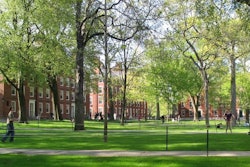 Today’s college students are less likely to start and finish at a single brick-and-mortar campus.
Today’s college students are less likely to start and finish at a single brick-and-mortar campus.Danine Adams has taken a few courses at a four-year university, some at a community college, and still more online while working all over the country as an investigator for the federal Bureau of Prisons—career experience that she has also been able to transform into academic credit.
A little from here. A little from there. And now Adams, who is 42, is just a few credits shy of earning a bachelor’s degree.
“I’m the whole ball of wax,” she says cheerfully: “on-campus education, community college, online classes, life experience.”
She’s also a forerunner of a new type of college student, one who doesn’t start and finish at a single brick-and-mortar campus, but picks and chooses credits toward a degree or job from a veritable buffet of education options.
These include dual-enrollment courses—college-level courses offered to students while they’re still in high school—advanced-placement programs, military or corporate training, career and life experience, and classes taught online.
“We are at or approaching a point of significant transformation where you will be able to snap modules together from a wide array of choices, or link them in ways that produce what are sometimes called stackable credentials,” says Molly Corbett Broad, president of the American Council on Education, the predominant national association of colleges and universities.
All of these alternatives to conventional higher education are growing exponentially, thanks to their flexibility and, often, considerably lower cost.
A new federal report shows that 1.3 million high school students took courses for college credit in the 2010-2011 academic year, up 67 percent from the last time the government checked, in 2003.
More than half of all colleges award at least some credit for military and career experience, according to the Council for Adult and Experiential Learning, or CAEL. The number of transcripts from military and corporate training courses submitted for college credit through an accreditation service provided by ACE rose 35 percent in the last 10 years, and a consortium of colleges that agree to accept credit for military experience now awards an average of just under 18 credits per year to each of more than 45,000 service members.
Meanwhile, more than 6 million people are enrolled in one or more college classes online, the Babson Survey Research Group and the College Board report.
“You’re seeing learning becoming much more open,” says Mark Milliron, chancellor of the Texas branch of Western Governors University, which awards degrees based on “real-world competencies” obtained from work experience and elsewhere. “People have access now to lots of different learning resources, and ways to prove what they’ve learned.”
Other than at a handful of accredited alternative universities such as Western Governors, however, getting a degree in this way depends on mainstream schools accepting nontraditional credits toward one, something they’ve been slow to do. After all, it cuts into their business of providing classroom education for a fee. There are also legitimate concerns about quality. Just because ACE accredits certain military and corporate courses for academic credit doesn’t mean that colleges are required to accept them, and there’s no way of tracking whether they do.
Last year, when the Department of Defense asked colleges that enroll service members under the department’s tuition reimbursement plan to accept more nontraditional credits—which would have saved the government money—the colleges balked, saying it was undue interference, and the Pentagon backed down.
But under growing pressure to improve graduation rates, more colleges and universities are coming to terms with this new higher-education model.
“What we’re seeing, in dramatic ways, is this kind of informal learning beginning to creep into the more formal learning environment,” says David Theo Goldberg, a professor at the University of California, Irvine, and co-founder of the Humanities, Arts, Science and Technology Advanced Collaboratory, which promotes technology in teaching.
A survey by the education marketing company Stamats found that offering credit for life experience helps attract the lucrative and growing segment of older-than-traditional-age college-goers. It’s also a way to meet the national goal of increasing the number of Americans with university degrees, since an estimated 37 million adults have almost, but not quite enough, college credits to get one, Milliron says.
And public universities, whose funding increasingly depends on graduation rates instead of enrollment, have an incentive to recruit students with career experience, whom a CAEL study showed are more than twice as likely to graduate as students without it.
“Institutions of higher education are going to have to ask hard questions about whether internal barriers are stopping students who have learned something from getting credit for that learning because of institutional history or policy,” Milliron says.
Some states, including Colorado, Minnesota, and Vermont, aren’t waiting for their public universities to award credit for military and career experience. They’re ordering them to start that process. And a proposal in the California state Senate would push public universities in that state to accept credit for certain outside online courses, including some provided by for-profit companies.
One reason for all this attention is that unconventional credit is often cheaper than the traditional kind, for both students and taxpayers. Applicants usually must pay fees to prove they’ve actually learned something elsewhere―say, by submitting portfolios or taking assessment tests―but a student who earns 15 credits for career experience can save from $1,605 at a large public university to $6,000 at a private one, according to CAEL. It also saves time. With their credits from “real-world” experience, Western Governors University says its students take an average of 35 months to earn a bachelor’s degree, compared to more than 50 months at other higher-education institutions. In March, the government gave the idea another boost by saying federal financial aid could be applied to the cost of assessing prior learning in this way.
Companies, organizations, and government agencies―including Microsoft, Disney-Pixar, Intel, NASA, and Mozilla, the company that developed the Firefox web browser—are now developing digital “badges,” which would track a person’s experience and skills in addition to, or even instead of, university degrees.
Several websites have sprung up to help students “bank” their credentials, or tell them which institutions will award them academic credit for career experience.
“People are finding themselves taking a smattering of credits and programs and life experiences, and would like to find a way for those to count,” says Ramin Sedehi, director of higher education consulting at the Berkeley Research Group.
Some activists are pushing this movement even further, suggesting that people forgo college altogether and do their higher learning elsewhere. That’s the subject of a new book called “Hacking Your Education: Ditch the Lectures, Save Tens of Thousands, and Learn More Than Your Peers Ever Will,” by Dale Stephens, head of an organization called UnCollege, who suggests that work experience, internships, online courses, and other alternatives provide the kind of education that employers value.
“I don’t have anything against universities or colleges,” says Stephens, who received a fellowship from billionaire Facebook founder Peter Thiel that pays students under 20 a $100,000 stipend to drop out of college and become entrepreneurs. “My problem is with people going to universities or colleges simply because they think that’s what is expected of them.”















